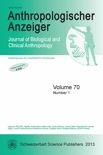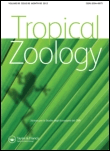
ANTHROPOLOGISCHER ANZEIGER
Scope & Guideline
Advancing Knowledge in Anthropology and Ecology
Introduction
Aims and Scopes
- Bioarchaeology and Human Remains Analysis:
The journal frequently publishes articles that analyze skeletal remains, providing insights into health, disease, diet, and social structures of ancient populations. - Anthropometric Studies:
Research on body measurements and proportions is a core focus, exploring variations across different populations and the implications of these variations for health and physical fitness. - Paleopathology:
The analysis of diseases and injuries in skeletal remains is a significant area of research, contributing to our understanding of historical health issues and their social implications. - Genetic and Evolutionary Anthropology:
The journal includes studies on genetic diversity and evolutionary adaptations in human populations, linking biological data with anthropological insights. - Methodological Innovations:
A unique contribution of the journal is its emphasis on new methodologies, such as 3D imaging and machine learning applications in anthropological research.
Trending and Emerging
- Interdisciplinary Approaches:
There is an increasing trend towards interdisciplinary research that integrates anthropology with genetics, epidemiology, and social sciences, enhancing the understanding of complex human behaviors and health outcomes. - Health and Nutrition Studies:
Emerging themes include a strong focus on the relationships between nutrition, health, and body composition, particularly in the context of modern challenges like obesity and malnutrition. - Technological Integration in Research:
The use of advanced technologies, such as 3D imaging, machine learning, and bioinformatics, is becoming more prevalent, allowing for more precise and comprehensive analyses of anthropological data. - Cultural and Socioeconomic Influences on Health:
Research exploring the impact of cultural practices and socioeconomic factors on health outcomes is gaining traction, reflecting a broader understanding of health as a social construct. - Palaeodiet and Stable Isotope Analysis:
There is a notable increase in studies utilizing stable isotope analysis to reconstruct past diets and understand the dietary habits of ancient populations, linking them to environmental and cultural contexts.
Declining or Waning
- Traditional Skeletal Measurements:
While still relevant, the reliance on traditional methods for sex estimation and anthropometric measurements has decreased as more advanced imaging and analytical techniques gain traction. - General Studies on Historical Populations:
Research focusing solely on descriptive studies of historical populations without a specific methodological or theoretical framework appears to be waning, as there is a growing preference for interdisciplinary and applied approaches. - Narrow Focus on Specific Pathologies:
There is a noticeable decline in papers addressing very specific pathologies in isolation, as broader health trends and their socio-cultural contexts become more prominent.
Similar Journals

HOMO-JOURNAL OF COMPARATIVE HUMAN BIOLOGY
Exploring the Depths of Human BiologyHOMO - Journal of Comparative Human Biology is a prestigious academic journal dedicated to advancing the field of comparative human biology, offering a platform for researchers, professionals, and students to disseminate cutting-edge findings. Published by E Schweizerbart'sche Verlagsbuchhandlung in Germany, this journal has been a crucial resource since its inception in 1950, featuring a rich archive of studies until 2023. It holds a Q3 quartile ranking in Anthropology and a Q4 quartile ranking in Miscellaneous Medicine, reflecting its significance and influence within the academic community. Although not an Open Access journal, it provides a wealth of robust research that intersects with various disciplines within the anthropological sciences. Researchers looking for a wide array of comparative studies and insights into human biology will find HOMO an invaluable addition to their scholarly resources.

Avian Biology Research
Empowering the next generation of avian researchers.Avian Biology Research, published by SAGE PUBLICATIONS LTD, is a leading journal dedicated to advancing the study of avian species through high-quality, peer-reviewed research. With an ISSN of 1758-1559 and an E-ISSN of 1758-1567, this journal has established itself as a vital resource within the fields of Animal Science and Zoology, as well as Ecology, Evolution, Behavior, and Systematics. The journal is currently ranked Q3 in both categories according to the 2023 release of the category quartiles, and it contributes significantly to the global understanding of avian biology, including behavior, physiology, and conservation efforts. Positioned within the competitive landscape of the Scopus rankings, it finds itself amidst a diverse array of research, with medical and environmental implications. As an open-access journal, Avian Biology Research ensures greater accessibility to its contents, fostering disseminative opportunities for researchers, professionals, and students alike. With a publication window spanning from 2008 to 2024, it continues to be an invaluable platform for the dissemination and dialogue of avian research, thereby enlightening future inquiries and driving scientific advancements in this crucial area of biology.

INTERNATIONAL JOURNAL OF OSTEOARCHAEOLOGY
Pioneering Insights into Past SocietiesWelcome to the INTERNATIONAL JOURNAL OF OSTEOARCHAEOLOGY, an esteemed publication in the fields of anthropology and archaeological science, published by Wiley. Established in 1991, this journal has consistently provided a platform for groundbreaking research, with its scope encompassing the study of human remains in archaeological contexts. Boasting an impressive impact factor and ranking in the top quartile (Q1) for Anthropology and Archaeology, the journal stands at the forefront of academic discourse, particularly in the arts and humanities. With Scopus rankings placing it within the 88th percentile in Archeology and the 81st percentile in Anthropology, it serves as a vital resource for researchers, professionals, and students alike. Though currently not offering Open Access, the journal remains committed to disseminating high-quality research that contributes significantly to our understanding of past societies through the careful study of osteological remains. Explore our extensive archives and join a community of scholars dedicated to advancing knowledge in osteoarchaeology.

TROPICAL ZOOLOGY
Exploring the vibrant ecosystems of the tropics.TROPICAL ZOOLOGY is a prestigious academic journal dedicated to advancing knowledge and research in the fields of animal science, zoology, and ecology. Published by PAGEPRESS PUBL, this journal has been an integral part of the scientific community since its inception in 1988, providing a platform for the dissemination of innovative research and discoveries related to tropical wildlife and ecosystems. With an impact factor placing it in the Q3 category for both Animal Science and Zoology, as well as Ecology, Evolution, Behavior, and Systematics, it ranks among the noteworthy publications in these fields. Researchers, professionals, and students will find that TROPICAL ZOOLOGY is an essential resource for the latest findings, fostering a deeper understanding of biodiversity and conservation in tropical environments. The journal is based in the United Kingdom, with additional administrative support from MEDIGROUP in Italy, ensuring a broad international perspective and reach. While it does not operate under an open access model, it remains committed to high-quality peer-reviewed content that contributes significantly to the understanding of tropical ecosystems and the species that inhabit them.

Cambridge Journal of Anthropology
Advancing anthropological insights for a global audience.Cambridge Journal of Anthropology is a prestigious and internationally recognized journal published by BERGHAHN JOURNALS, dedicated to advancing the field of anthropology. The journal, with ISSN 0305-7674 and E-ISSN 2047-7716, has embraced an Open Access model since 2020, ensuring that groundbreaking anthropological research is easily accessible to scholars, practitioners, and students worldwide. With a commitment to enriching the academic discourse in anthropology, the journal welcomes high-quality articles that contribute to both theoretical and applied aspects of the discipline. The Cambridge Journal of Anthropology serves as a vital resource for researchers eager to explore contemporary anthropological issues, fostering an inclusive dialogue on cultural diversity, social structures, and human experiences. As scholars increasingly turn to open platforms for disseminating their work, this journal stands out as a leading venue for innovative research that shapes the future of anthropology.

ZOOLOGICHESKY ZHURNAL
Fostering a deeper understanding of life’s diversity and evolution.Zoologichesky Zhurnal, a prominent journal in the field of Ecology, Evolution, Behavior and Systematics, has been a vital publication since its inception in 1950. Published by MAIK Nauka-Interperiodica in the Russian Federation, this journal has established a notable reputation in disseminating scientific research and advancing knowledge in zoology. With its coverage spanning from 1950 to 2023, and a specific convergent focus during 1982-1983, this journal contributes significantly to the ecological and evolutionary sciences, even though it currently holds a Q4 classification in the 2023 category quartiles, indicating its niche positioning among peers. Researchers and students engaged in the study of biological sciences, particularly those interested in the dynamics of ecosystems, behavior of species, and evolutionary processes, will find valuable insights and original research articles within its pages. While access to this esteemed journal is not open, it remains an essential resource for those seeking to deepen their understanding of zoological sciences.

ANNALS OF HUMAN BIOLOGY
Unraveling the Complexities of Human BiologyANNALS OF HUMAN BIOLOGY is a distinguished academic journal published by Taylor & Francis Ltd that focuses on the intersection of human biology and health sciences. With an ISSN of 0301-4460 and an E-ISSN of 1464-5033, this journal has been a pivotal resource for researchers and practitioners since its inception in 1974. Covering critical domains such as Aging, Epidemiology, Genetics, Physiology, and Public Health, it exemplifies an interdisciplinary approach that enhances our understanding of human biological variation and its implications for health and disease. While it currently does not offer Open Access, the journal maintains a respectable standing in its field with notable rankings in Scopus, reflecting its contributions to scientific knowledge. Its commitment to high-quality research and comprehensive review makes it an essential platform for scholars, healthcare professionals, and students seeking to explore the biological underpinnings of human health.

Relaciones
Advancing Knowledge, Enriching Perspectives.Relaciones is a prestigious open-access journal published by the SOC ARGENTINA ANTROPOLOGIA, dedicated to the field of anthropology. Since its inception in 1937, this journal has served as a vital platform for disseminating innovative research and insights within the social sciences community. With both its print (ISSN: 0325-2221) and online (E-ISSN: 1852-1479) formats, Relaciones ensures widespread accessibility, empowering researchers, professionals, and students to engage with contemporary anthropological discourse. The journal aims to foster critical discussions that not only reflect on cultural and societal issues but also contribute to theoretical advancements in anthropological methodologies. By maintaining a commitment to quality and open access, Relaciones plays a crucial role in shaping the future of anthropology in Argentina and beyond, encouraging scholarly collaboration and enriching the academic landscape.

Archaeological and Anthropological Sciences
Where Science Meets the HumanitiesArchaeological and Anthropological Sciences is an esteemed peer-reviewed journal published by Springer Heidelberg, specializing in the interdisciplinary fields of archaeology and anthropology. Since its inception in 2009, this journal has established itself as a pivotal resource for researchers and professionals, featuring cutting-edge studies that bridge the gap between the sciences and humanities. With its impressive 2023 Q1 rankings in Anthropology and Archaeology categories, the journal stands out in the Scopus landscape, ranking within the top 5% of its field—Rank #18/413 in Archaeology (Arts and Humanities) and Rank #28/502 in Anthropology. This is complemented by its commitment to disseminating high-quality research to a global audience, despite being a non-Open Access publication. The journal's scope encompasses innovative methodologies, archaeological findings, and anthropological insights that are vital for advancing knowledge and fostering academic discourse. As it moves toward its upcoming converged years, Archaeological and Anthropological Sciences continues to solidify its reputation as a key forum for scholarly exchange in these fields.

ZOOLOGICAL SCIENCE
Fostering Conservation Through Scholarly ExchangeZoological Science, published by the Zoological Society of Japan, is a leading journal dedicated to the fields of animal science and zoology. With its ISSN 0289-0003, this respected publication has established itself as a prominent source of scientific research, attaining a commendable Q2 ranking in the 2023 category of Animal Science and Zoology. Spanning over three decades, from 1992 to 2024, the journal offers a valuable platform for scholarly articles that explore various aspects of zoology, including ecology, behavior, and evolutionary biology. Although it operates under a traditional subscription model, its contributions are supported by a robust community of researchers and professionals who value its insights. The journal strives to foster academic discourse and insights that drive understanding and conservation of wildlife, making it an essential resource for students and established experts alike. The publishing headquarters located in Tokyo, Japan, further enhances its international reach and influence in zoological studies.